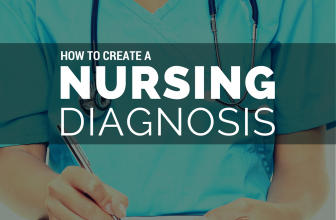
The nursing process can be defined as steps or a series of phases that have been designed to help nurses offer their patients the best care possible. These steps came into being due to the need to create uniformity and standardization in the care provided by a nurse. They are also meant to help patients know what to expect from a nurse and also to understand better what nurses have to go through to give them quality care. And so this process can also be defined as a guideline for the caregiving process in hospitals and any other facilities such as a nursing home where the intervention of a nurse is required.
Contents:
- Purpose of the Process
- The 5 Steps of Nursing Process
- Importance of the Nursing Process
- Examples of Critical Thinking in the Nursing Process
- Key Factors That Influence the Process
Purpose of the Process
This process is considered the cornerstone of nursing and is also one of the most important processes in the entire healthcare sector. The purpose of this procedure is first to identify the health status of the patient by a careful assessment that will entail observation and conducting the required medical examinations. Here the aim is to determine actual conditions the patient may be suffering from and also any potential ones that they have the risk of suffering from based on the signs and symptoms that they have.

Another purpose of this process is to establish a plan to meet the needs of the patient that may be brought about by the actual or potential condition they are faced with. Note that the process will not only help the nurse establish a plan for intervention but also other healthcare professionals such as physicians whom it might be necessary for the patient to see. The other purpose of the process is to help the nurse deliver the specific intervention required to meet the particular needs of the patient. This process starts when the patient comes to the hospitals till they leave after their needs are met or after getting the care that they required. Due to this, the process is divided into five broad steps that the nurse has to follow.
The 5 Steps of Nursing Process
This process is cyclical meaning that the components in it follow a logical sequence or pattern. However, it is possible for more than one component to be involved at the same time and it happens very regularly. The components in this process are known as the five steps of the nursing process, and they include Assessment, Diagnosis, Planning, Implementing and evaluation. These phases are also commonly abbreviated as the ADPIE. Each of them contributes something specific in ensuring that the client gets the best care.

- Assessment: This is the first step in nursing care, and it usually starts when the patient first arrives at the facility or when he makes contact with the nurse. It involves the collection of as much information about the patient’s medical history as possible. Here the caregiver uses a dynamic and systematic approach to collect and analyze data on the information. It can involve simple things such as asking the patients some questions, making observations and reviewing their medical history. This assessment will include not only data on their physical health but also social, psychological, economic, spiritual and lifestyle factors.
- Diagnosis: Once the nurse has all the information on the patient and after analyzing it the next step in the process is the diagnosis. Diagnosis, as the name suggests, involves the clinical judgment of a nurse on the response of a patient to the actual or potential health condition. The diagnosis is done by a skilled nurse, and so it should be very detailed. For example, it should not just indicate that the patient is in pain but should also state that the pain has caused other problems like poor nutrition, anxiety and even a social effect like causing conflict in the family if that is the case. A detailed diagnosis should provide as much information as possible as it is critical for any interventions.
- Planning: After the diagnosis or once the patient and the nurse agree on it, a plan of action should be created. The purpose of the plan is to make the intervention that will follow a success. A care plan helps the nurse determine what needs to be done, how it should be done and when it is to be done so as to make sure that the care offered meets the medical requirements and expectations of the patient. Here the diagnosis should be addressed, and the head nurse will look at the symptoms and classify them according to their severity. Each of the problems is also assigned a measurable goal for the expected outcome. The assessment data is then written on the patient’s care plan so that nurses and everybody else caring for the patient has access to it.
- Implementation: This stage is where the nurse follows through with the care plan that was developed in the previous phase of the process. The care plan developed is specific for the patient, and it should focus on achieving attainable outcomes so that the implementation process may be successful. Actions involved in this stage include monitoring the client for signs of improvement or any new changes in the symptoms or condition, offering direct care and performing medical tasks. Other activities that may be done in the implementation stage may include instructing or educating patients on health management, referring and contacting the patient for follow-ups if need be. The implementation phase can take a couple of hours, weeks or even many months.
- Evaluation: This is the last step in the process, and it is done once all the interventions have taken place. The primary aim of evaluation is to determine whether the goals set in the care plan have been met. It can also be used to identify areas where the outcome is not desirable and to determine the reason behind this. Evaluation is not only beneficial to that specific patient but is also important in the development of care plans for future patients. In this stage, the patient’s condition can be described in any of the following three ways: condition of the patient has improved, the state of the patient has stabilized, and condition of the patient has deteriorated, discharged or died. If the patient has not shown any improvement or the set wellness goals have not been fulfilled the process has to begin again from step one.
Any nurse or any person that wants to pursue nursing must understand these steps in detail as they will be used every day in their career.
Importance of the Nursing Process
- The process helps to provide standardization in the care offered by nurses. Since a nurse knows what to do and the steps that they should follow to care for clients they can give the same high-quality services consistently.
- It speeds up the care process meaning that the intervention can be provided within a reasonable amount of time once the patient comes to the hospital. The nurse might be a trained medical personnel but no matter how skilled he or she may be it is impossible to determine the problem or needs of a patient without the first step that is the assessment. It makes it easy to identify the problem, come up with a care plan, and hence intervene without wasting any time.
- Without this process, there would be many mistakes in the caregiving process. As rare as they may be medical mistakes can be fatal and they are not always major things because something simple like failing to check on the patient routinely might cost their life.
- It is used to teach new nurses of what is expected of them once they get to the hospitals. Nursing as a profession is very complicated, and it involves many things, but this process summarizes everything into five simple steps.

Examples of Critical Thinking in the Nursing Process
Critical thinking is part of the nursing process, and this is the reason it is included in NCLEX questions and other certification examinations. The following are examples if critical thinking in the first three steps.
- The Assessment includes being able to tell apart relevant and irrelevant data, recognizing assumptions and categorizing data.
- In the Diagnosis stage, critical thinking entails things such as examining assumptions, making inferences, comparing patterns and identifying factors contributing to the issues.
- For Planning, it may include things such as hypothesizing, transfer of data from one condition/situation to the other and generalization of principles learned from other sciences.

Key Factors That Influence the Process
This does not always succeed. In fact, more often than not the process does not achieve the desired goals even if they looked very attainable. Several factors can contribute to this success or failure, but the following are among the common ones
- The competency of the nurse is crucial in this process because they determine how it goes. Being trained does not always make the nurse competent, and so their skills and expertise will directly influence the process.
- The attitude and character of the nurse are also crucial because no matter how skilled you may be it is easy to miss out something if you do not have the right state of mind.
- Work environment also determines whether the process is successful or not. Nurses are used to working under pressure but if it is too much it will affect their performance.
- The patient also has a significant role to play in the process and so if they are not cooperative the assessment will not be complete, and this will directly affect the process.













































































































































